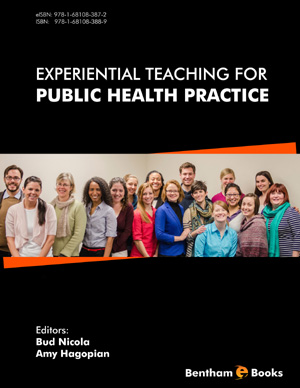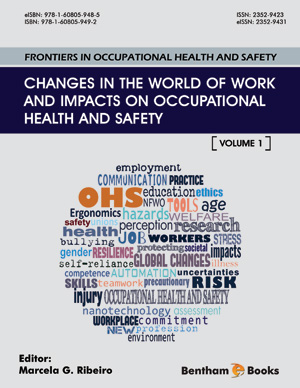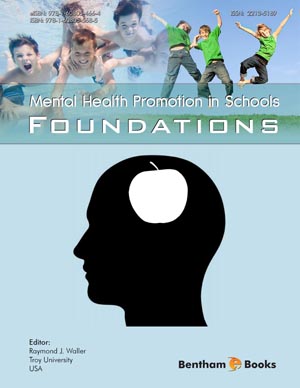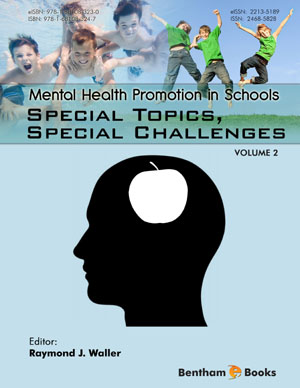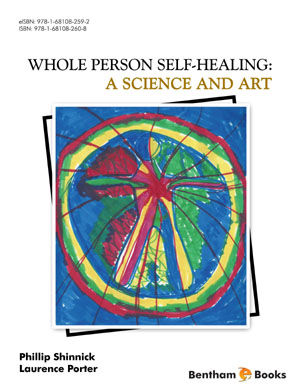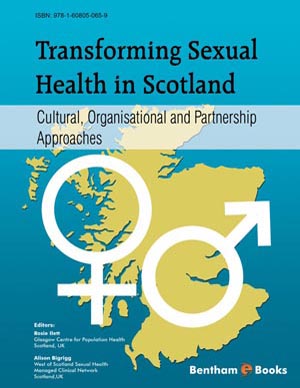Foreword
Page: i-ii (2)
Author: Patrick O`Carroll
DOI: 10.2174/9781681083872117010001
Acknowledgements
Page: vi-vi (1)
Author: Bud Nicola and Amy Hagopian
DOI: 10.2174/9781681083872117010003
List of Contributors
Page: vii-viii (2)
Author: Bud Nicola and Amy Hagopian
DOI: 10.2174/9781681083872117010004
Dedication
Page: ix-ix (1)
Author: Bud Nicola and Amy Hagopian
DOI: 10.2174/9781681083872117010005
Introduction and Background
Page: 3-9 (7)
Author: Aaron Katz, Jack Thompson and Frederick A. Connell
DOI: 10.2174/9781681083872117010006
Abstract
Faculty at the University of Washington School of Public Health developed an MPH program that departs significantly from traditional graduate training. They initially sought a pedagogy rooted in adult learning theory and social justice that would prepare courageous problem solvers and excellent critical thinkers. The first step toward this goal was selection of the problem-based learning method to replace the lecture mode. Faculty secured funds to support training in writing PBL cases and facilitating PBL groups, designing a curriculum, and developing administrative processes. They created a two-year curriculum that covers all the core competencies of public health through PBL cases, which are in part shaped by community partners. Fifteen years later, the program that resulted from this effort—the MPH in Community-Oriented Public Health Practice—continues to prepare public health professionals who demonstrate exceptional skills in self-discovery, leadership, teamwork, and collective analysis.
Competencies
Page: 10-21 (12)
Author: Amy Hagopian
DOI: 10.2174/9781681083872117010007
Abstract
All MPH programs in the United States seek accreditation by the Council on Education for Public Health (CEPH). CEPH promotes competency-based education, an institutional process that moves education from an emphasis on what academics believe graduates should know (teacher-focused) to an emphasis on what students should be able to do (student and workplace-focused). These competencies are associated with skills that will be demanded of graduates in their public health workplaces. To assess attainment of competencies, faculty must ask students to produce work products that demonstrate skill mastery. In contrast to typical classrooms, the MPH in Community- Oriented Public Health Practice (COPHP) uses problem-based learning (PBL) cases as the method for achieving competencies and creates real partnerships with government public health agencies and community-based organizations to engage students in producing work these organizations really need. The University of Washington adopted a set of MPH competencies in line with CEPH accreditation requirements, and we have mapped COPHP case learning objectives to these competencies. In this chapter, we discuss the evolution of the competency-based approach in our program, offer examples of problem-based cases from our public policy curriculum, and list the competencies that students will attain by the end of their participation in COPHP.
Pedagogy
Page: 22-30 (9)
Author: A. Gita Krishnaswamy and Bud Nicola
DOI: 10.2174/9781681083872117010008
Abstract
The founding faculty of the MPH in Community-Oriented Public Health Practice (COPHP) considered several learning models appropriate for students preparing for careers in public health practice (rather than research). They selected problem-based learning (PBL), which has been successfully applied by other practicebased disciplines and incorporates elements such as strong faculty-student collaboration, group learning, a reiterative research cycle, and case learning based on realworld problems. At its core, PBL is a method in which learning results from the intellectual process involved in understanding and resolving problems. These problems are presented in cases, written by COPHP faculty, that are often based on real public health situations at the state, national, or global level. Most courses also present at least one case that requires students to complete a real-time project at the request of a partner agency such as the local health department. Students explore and discuss the cases in small groups that simulate the structure of actual work environments such as health and human service agencies; and they learn to lead groups and to cope with functional and dysfunctional group dynamics. PBL cases are built on community issues, reinforcing the program's grounding in service learning in the community. The COPHP program also trains students and in use of a course management system through which students post their coursework. Both students and faculty provide continuous feedback on progress in facilitating student learning.
Administrative Considerations
Page: 31-40 (10)
Author: Peter House
DOI: 10.2174/9781681083872117010009
Abstract
The University of Washington’s MPH in Community-Oriented Public Health Practice (COPHP) program is fully committed to a problem-based learning pedagogy that is unique among degree programs in our School of Public Health and rare across the country. This intense method of teaching and learning places uncommon demands on teachers and students alike. To teach all aspects of public health practice and to craft a broad curriculum, we draw faculty from other departments in our school and from the practice field as well as from the academy. We select students who bring work experience in public health practice, who share our dedication to social justice, and who are fully prepared to undertake problem-based learning. In this chapter, we discuss the customized set of administrative skills and practices that we have developed to support COPHP and govern admissions, marketing, student support, faculty support and recruiting, instructional technology, educational evaluation, institutional relationships, anti-racism and social justice strategies, and alumni relations. Together, these processes ensure the success of COPHP in producing effective public health practitioners while keeping our fee-based program affordable to students.
Building a Culture
Page: 41-50 (10)
Author: A. Gita Krishnaswamy and Amy Hagopian
DOI: 10.2174/9781681083872117010010
Abstract
Faculty of the Community-Oriented Public Health Practice program (COPHP) continually refine our curriculum to support an anti-racist, inclusive program culture. COPHP faculty draws the most from successful contributions to their own learning, including trial and error, expert and personalized coaching, clear social and cultural expectations, and constructive feedback. COPHP “community of learners” begins to take shape at the first contact prospective students make with the program, as faculty and a graduate student coordinator assess applicants’ potential to succeed in COPHP and in using the problem-based learning (PBL) method. Program culture continues to evolve through a busy orientation week designed to prepare new students for the unique demands of PBL and introduce library research methods and the roles of public health workers. Perhaps the most important orientation week activity is “Case 0”, a practice PBL case through which students learn about the radical history of public health, adult learning theory, and institutional racism. In analyzing the case, students are exposed to a classroom culture that support formative, reiterative learning as well as self-reflection and equitable team roles and processes. The combination of COPHP’s dynamic learning culture, social justice orientation, and student leadership strives to support student activism and community service. In the recent years, COPHP students have helped form two important student-led organizations that address racism, oppression, and reproductive rights. Graduates tend to maintain strong relationships with the program, faculty, and local organizations, further extending COPHP’s vital community.
The Handbooks
Page: 51-59 (9)
Author: Brett Niessen and Kelly Gilmore
DOI: 10.2174/9781681083872117010011
Abstract
COPHP uses a series of handbooks to orient students and faculty to the program and to share the program policies and practices. The student handbook for the Community-Oriented Public Health Practice (COPHP) program describes a shared vision of expectations for students, faculty, and alumni. COPHP faculty members drafted the initial version of the handbook, which described the problem-based learning (PBL) process, expectations for student work, and information on capstone and practicum projects. Student coordinators have since developed three handbooks: a general guide for students, a resource about capstones, and an introduction for new faculty. This chapter summarizes the history, development, and purpose of the student handbook and a brief description of the faculty handbook and the capstone handbook. It also describes specific components that are included to facilitate PBL and communitybuilding within the program; because students depend on each other for their learning in PBL, it is important to outline expectations for participation within COPHP community. The student handbook is available online to give prospective students the opportunity to learn what it means to be a part of COPHP community and decide whether the program is right for them. We encourage anyone creating a program similar to COPHP to engage students, faculty, and alumni in the process of creating such a document, which functions as a statement of shared values.
The Capstone
Page: 60-68 (9)
Author: Amy Hagopian
DOI: 10.2174/9781681083872117010012
Abstract
All MPH programs accredited by the Council on Education for Public Health are required to provide a culminating experience in which students demonstrate their skills and integrate knowledge. In the MPH in Community-Oriented Public Health Practice (COPHP), this experience is the capstone. The idea is to apply theoretical knowledge learned in the classroom to a situation that mimics the demands of professional practice. Faculty coach students through this project, and they assess at its conclusion how well students have mastered the identified body of knowledge and whether they have acquired the competencies required to be public health professionals. For their capstone projects, students establish relationships with clients—typically government public health agencies or community-based organizations—who have real work to do and can support such a learning experience for COPHP students. We have developed an approach to the capstone that allows students a wide range of choices of types of projects while providing a highly structured and motivating environment in which to complete the work. To help our students produce strong culminating projects, we have developed strong expectations and norms. We also apply our own tracking and organizing tools and adhere to our clearly defined philosophy and culture.
The Practicum
Page: 69-77 (9)
Author: Karen Hartfield
DOI: 10.2174/9781681083872117010013
Abstract
The MPH in Community-Oriented Public Health Practice (COPHP) supports a robust practicum program through a formal partnership with its local health department, Public Health—Seattle & King County, that provides students an opportunity to integrate academic training and practice within a metropolitan health department setting. This arrangement began in 2003, when the University of Washington School of Public Health and Community Medicine and the Public Health agency received a one-year Associated Schools of Public Health “academic health department” grant. Since then, the health department has served as a teaching institution for COPHP students and a venue to train students on-site in real-world public health practice. COPHP student and faculty linkages provide a vehicle to enhance the public health workforce through resource sharing and technical assistance, and have expanded public health department staff opportunities to conduct community-based public health research and projects with UW faculty. Nearly all first year COPHP students are placed in practicum assignments at Public Health that complement their coursework. COPHP pays for a part-time practicum coordinator who is a Public Health employee and a COPHP graduate. The coordinator solicits practicum opportunities from Public Health staff, reviews projects for feasibility and appropriateness of skills, oversees students’ self-assessments, and works with site supervisors to initiate the practicums. Students work closely with faculty advisers throughout the process. Practicum projects include community assessment, health education, program planning and evaluation, policy development, and community mobilization. The service learning experience has been beneficial to Public Health, COPHP students, and the greater King County community.
Skills Seminars
Page: 78-82 (5)
Author: Bud Nicola
DOI: 10.2174/9781681083872117010014
Abstract
As we developed the curriculum for the MPH in Community-Oriented Public Health Practice (COPHP), it became clear that there were skills and competencies that might best be taught using traditional lecture or interactive faculty presentation and discussion methods rather than problem-based learning (PBL). We see some of these skills as prerequisites to PBL. We try to align these traditional learning sessions, or seminars, with PBL cases and the faculty who facilitate them. Since students, through their periodic input, helped to design the overall COPHP, we have integrated into our program design opportunities for students to take charge of organizing seminars during the second year.
COPHP Curricular Content Areas
Page: 83-83 (1)
Author: Bud Nicola and Amy Hagopian
DOI: 10.2174/9781681083872117010015
Population Health
Page: 84-88 (5)
Author: Stephen A. Bezruchka
DOI: 10.2174/9781681083872117010016
Abstract
A population's health status and factors determining it are vital to producing health of the citizens therein. The evidence is overwhelming that people in the United States have worse health outcomes than those in other rich nations. Yet this fact is little appreciated in the United States. U.S. public health practice remains rooted in the 20th century with efforts to change personal behaviors, access health care, and ensure satisfactory sanitation outcomes. Professional public health education remains similarly stuck in the last century's paradigms. The population health block of the MPH in Community-Oriented Public Health Practice attempts to orient students to 21st century public health with a focus on creating appropriate structures in societies to make a population healthy. Such an approach is inherently political, which is a challenge in the United States because we tend to view health through an apolitical lens. This chapter explains the population health approach, which requires students to look at other countries to learn about health production. The goal: for people in the United States to not be dead first but to live longer healthier lives.
Community Development
Page: 89-96 (8)
Author: Peter House
DOI: 10.2174/9781681083872117010017
Abstract
Community development is a key concern of public health and a central focus of the MPH in Community-Oriented Public Health Practice (COPHP) curriculum. Our community development blocks, which occur in both the first and second year of COPHP, introduce students to the challenges of working with communities on issues related to health. These blocks are intense for faculty and students alike because they must cover in a short period a broad range of material that spans sociology, organizational theory, epidemiology, and psychology. They also require students to make quick connections between a growing body of research literature and real word community challenges; entail organizing and conducting fieldwork with community partners; and expose students to provocative ideas and norms. The COPHP program has achieved considerable success with its community development blocks in meeting learning objectives that address issues such as defining and applying a true concept of community in a variety of settings; recognizing communities’ assets and problems; describing approaches to getting things done at the community level and assembling a team to do them; and completing strong written assignments on tight deadlines. Through the community development blocks and student projects, the COPHP program has built enduring connections with community partners and has helped address local challenges ranging from securing housing and health services for homeless youth to accommodating the needs of recent immigrants in disaster preparedness.
Quantitative Research Methods
Page: 97-108 (12)
Author: Ann Vander Stoep, Jim Gale, Michelle Garrison and Susan Buskin
DOI: 10.2174/9781681083872117010018
Abstract
When public health graduate students enroll in their first epidemiology and biostatistics courses, they vary widely in their knowledge of and comfort with quantitative research methods. This chapter highlights the challenges and rewards of presenting quantitative concepts to students using a problem-based learning (PBL) approach. We suggest adaptations to usual PBL practice to optimize learning for a diverse group of learners. We introduce instructors to a variety of teaching tools for conveying quantitative methods course learning objectives. We provide synopses of six PBL cases and suggest ways to develop cases that incorporate “shoe leather epidemiology” and meet community data analytic needs. Finally, we contrast learning through lecture with learning through experience, arguing that with PBL, students gain knowledge about quantitative research methods that is more than skin deep, and as such, has longer and deeper staying power when graduates embark on their careers as public health practitioners.
Environmental Health
Page: 109-115 (7)
Author: Tania M. Busch Isaksen, Wayne Turnberg and Jude Van Buren
DOI: 10.2174/9781681083872117010019
Abstract
The Environmental Health block of the MPH in Community-Oriented Public Health Practice is designed to help students understand the environmental public health system and how it investigates and reduces community risks from agents that cause disease, injury, and death. The case studies primarily address the recognition of various hazards in the environmental and occupational setting; the theoretical construct for understanding the properties of these hazards; the exploration of the factors that can generate or diminish exposure and reduce disease incidence and severity, especially in vulnerable populations; and the importance of risk communication in addressing environmental issues. The cases ensure that students learn about local, state, and national laws and regulations promulgated to reduce exposure and disease from environmental factors and also how to mine these standards for gaps and incongruent policies. They focus on determining causal factors and mitigation approaches as they explore the politics and pressures of the environmental health challenge. We press students to search for inequities in exposure and disease risk such as evidence of institutional racism in high risk communities. This core prepares public health practitioners to work on community environmental health risks to reach fair resolutions and reduce adverse health outcomes.
Health Behavior and Health Promotion
Page: 116-122 (7)
Author: Sarah Ross-Viles and Hendrika Meischke
DOI: 10.2174/9781681083872117010020
Abstract
Students in the MPH in Community-Oriented Public Health Practice (COPHP) frequently progress to careers that require strong skills in health behavior and health promotion. Learning objectives for COPHP’s Health Behavior and Health Promotion block cover skills in program planning and assessment, theories of behavior change, and application of an equity lens in health promotion. Cases in this block explore content through specific health topics. As in other COPHP blocks, students teach themselves and each other as they review cases, write and discuss learning objectives, post research findings, and conduct practical assignments. Faculty who facilitate this block rewrite cases annually to ensure they include at least one timely topic that the students will be eager to explore, and real world practitioners lead seminars that complement the cases. Challenges of the Health Behavior and Health Promotion block include teaching complex theory and extensive skills in a short time, keeping the health topics compelling to students, and making sure students maintain an appropriate balance between exploring interesting health topics and understanding the fundamentals of health promotion.
Evaluation
Page: 123-127 (5)
Author: Ian Painter, Tao Sheng Kwan-Gett and Amy Hagopian
DOI: 10.2174/9781681083872117010021
Abstract
COPHP Evaluation block occurs over a four week period during the second year of the program. It builds on a case that focuses on designing an evaluation for an outside client. The evaluation requirements are detailed early on in the case, and the class subsequently meets with the client to clarify questions about the evaluation and understand constraints on the process. Students then design the evaluation, write a report on the evaluation plan, and present the plan to the client at the end of the course. The case covers evaluation theory in the first two days, and the course focuses on applying to the design process both evaluation theory and quantitative design skills covered previously in the quantitative methods block (epidemiology and biostatistics). The block emphasizes the important skills of interacting with clients and eliciting and clarifying evaluation requirements.
Policy
Page: 128-133 (6)
Author: Lena Nachand, Aaron Katz and Amy Hagopian
DOI: 10.2174/9781681083872117010022
Abstract
The policy block is a cornerstone of COPHP experience. For 10 weeks at the beginning of the second year of the program, students engage in public discussions across all spectrums of the social determinants of health and such non-traditional public health topics as free trade and nuclear waste disposal. During this block, students work through real-life scenarios and participate in actual policy development. They benefit from the close relationships the program maintains with non-profit organizations, and the work they have conducted under their auspices during the policy block has been well-received and influential. In the course of community-based projects, students work in concert with local stakeholders and public policy makers. By the end of the block, students have learned the basic concepts, analytical tools, and skills for policy analysis, development, and advocacy, and some have also developed the inclination to pursue public health policy careers.
Management and Leadership
Page: 134-139 (6)
Author: Chris Hurley, Katie Bell and Bud Nicola
DOI: 10.2174/9781681083872117010023
Abstract
The Management and Leadership block in the COPHP program focuses on providing students with the skills and knowledge needed to direct and coordinate the efforts of individuals and organizations. Managers and leaders accomplish their work through and with others and must understand, motivate, and manage individuals, groups, and teams. Managers also establish directions, plan and organize the work to be done, identify and resolve problems, budget and manage the organization’s resources, evaluate and improve performance, drive change, and establish and manage external relationships. In this block, we use cases set in a variety of different community health settings to explore the full range of management and leadership skills. Mini-cases illustrate management principles. Students visit several community organizations to observe management at work.
The Committee on Oppression, Racism, & Education (CORE)
Page: 140-145 (6)
Author: Ariel Hart, Jennifer Hagedorn, Anne Althauser, Tara Bostock, Afomeia Tesfai, CORE Founders and Amy Hagopian
DOI: 10.2174/9781681083872117010024
Abstract
The Committee on Oppression, Racism, and Education (CORE) is a group of Community-Oriented Public Health Practice (COPHP) students working to integrate anti-racist principles into the program. CORE provides a common language and framework to discuss racism in COPHP. It has a twofold overall purpose: to tackle manifestations of racism playing out in the classroom environment and in the COPHP program structures, and to ensure all students graduating from the COPHP program are prepared to address issues of racial equity as public health practitioners. By confronting the underlying drivers of health disparities that plague people of color, CORE has become a force for institutional change not just in COPHP but also in the School of Public Health, elsewhere in the University of Washington, and in the community.
Final Thoughts about the Future of COPHP and Conclusions
Page: 146-150 (5)
Author: Amy Hagopian, Bud Nicola and Peter House
DOI: 10.2174/9781681083872117010025
Abstract
Public higher education in the United States is in great flux. A number of factors adversely affecting the effectiveness of higher education in the U.S., such as the erosion of public financial support, have undermined the COPHP program. Recruiting and retaining an ideal mix of motivated students and faculty are ongoing program tasks. In spite of these challenges, COPHP is an effective program for producing successful, motivated, and highly sought-after graduates in public health.
Appendix A-List of Online Resources
Page: 151-151 (1)
Author: Bud Nicola and Amy Hagopian
DOI: 10.2174/9781681083872117010026
Appendix B-COPHP Peer Review Process
Page: 152-152 (1)
Author: Bud Nicola and Amy Hagopian
DOI: 10.2174/9781681083872117010027
Appendix C-COPHP Learning Objectives Compared to University of Washington MPH Competencies
Page: 153-155 (3)
Author: Bud Nicola and Amy Hagopian
DOI: 10.2174/9781681083872117010028
Appendix D-Student Feedback Form
Page: 156-159 (4)
Author: Bud Nicola and Amy Hagopian
DOI: 10.2174/9781681083872117010029
Appendix E-Orientation Week Schedule
Page: 160-160 (1)
Author: Bud Nicola and Amy Hagopian
DOI: 10.2174/9781681083872117010030
Appendix F-Sample Practicum Project Description
Page: 161-164 (4)
Author: Bud Nicola and Amy Hagopian
DOI: 10.2174/9781681083872117010031
Appendix G-Practicum Self-Assessment Survey
Page: 165-166 (2)
Author: Bud Nicola and Amy Hagopian
DOI: 10.2174/9781681083872117010032
Appendix H-Service Learning Contract
Page: 167-171 (5)
Author: Bud Nicola and Amy Hagopian
DOI: 10.2174/9781681083872117010033
Appendix I-Sample Daily Learning Objectives
Page: 172-173 (2)
Author: Bud Nicola and Amy Hagopian
DOI: 10.2174/9781681083872117010034
Appendix J-Sample Case Facilitator Notes
Page: 174-176 (3)
Author: Bud Nicola and Amy Hagopian
DOI: 10.2174/9781681083872117010035
Appendix K-Strategic Plan Excerpts
Page: 177-178 (2)
Author: Bud Nicola and Amy Hagopian
DOI: 10.2174/9781681083872117010036
Appendix L-COPHP Case Subscription Information
Page: 179-179 (1)
Author: Bud Nicola and Amy Hagopian
DOI: 10.2174/9781681083872117010037
Subject Index
Page: 180-183 (4)
Author: Bud Nicola and Amy Hagopian
DOI: 10.2174/9781681083872117010038
Introduction
Developing an effective program requires a sound administrative system and a supportive educational culture including the support of program handbooks, a Master’s project (Capstone), practicum, and skill development seminars. Experiential Teaching for Public Health Practice describes the underlying PBL and community framework for a teaching program along with a description of the competencies needed to meet workplace demands and educational accreditation requirements. It has been developed by members of University of Washington’s Community-Oriented Public Health Practice program (COPHP) curriculum. This curriculum mirrors core programmatic areas of population health, community development, quantitative research methods, environmental health, health behavior and health promotion, evaluation, policy, and management and leadership. Key features include: - Structured template outlining the basics of PBL programs - Case examples given in each curricular area - Detailed appendices with sample cases and links to original source documents - A focus on principles of racial equality This book is designed to give the reader hands-on help in designing and improving educational programs. It is suitable for all higher education administrators and faculty looking to improve the teaching and learning effectiveness of any academic program.


